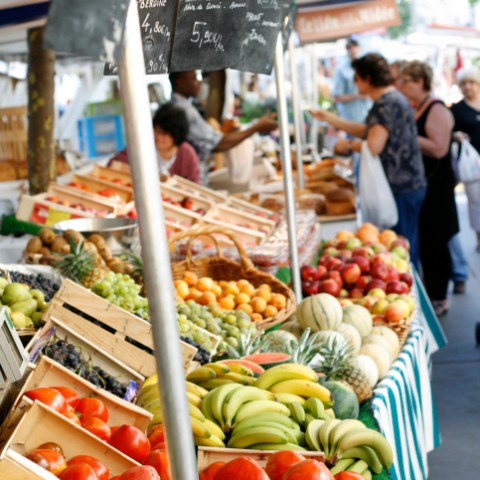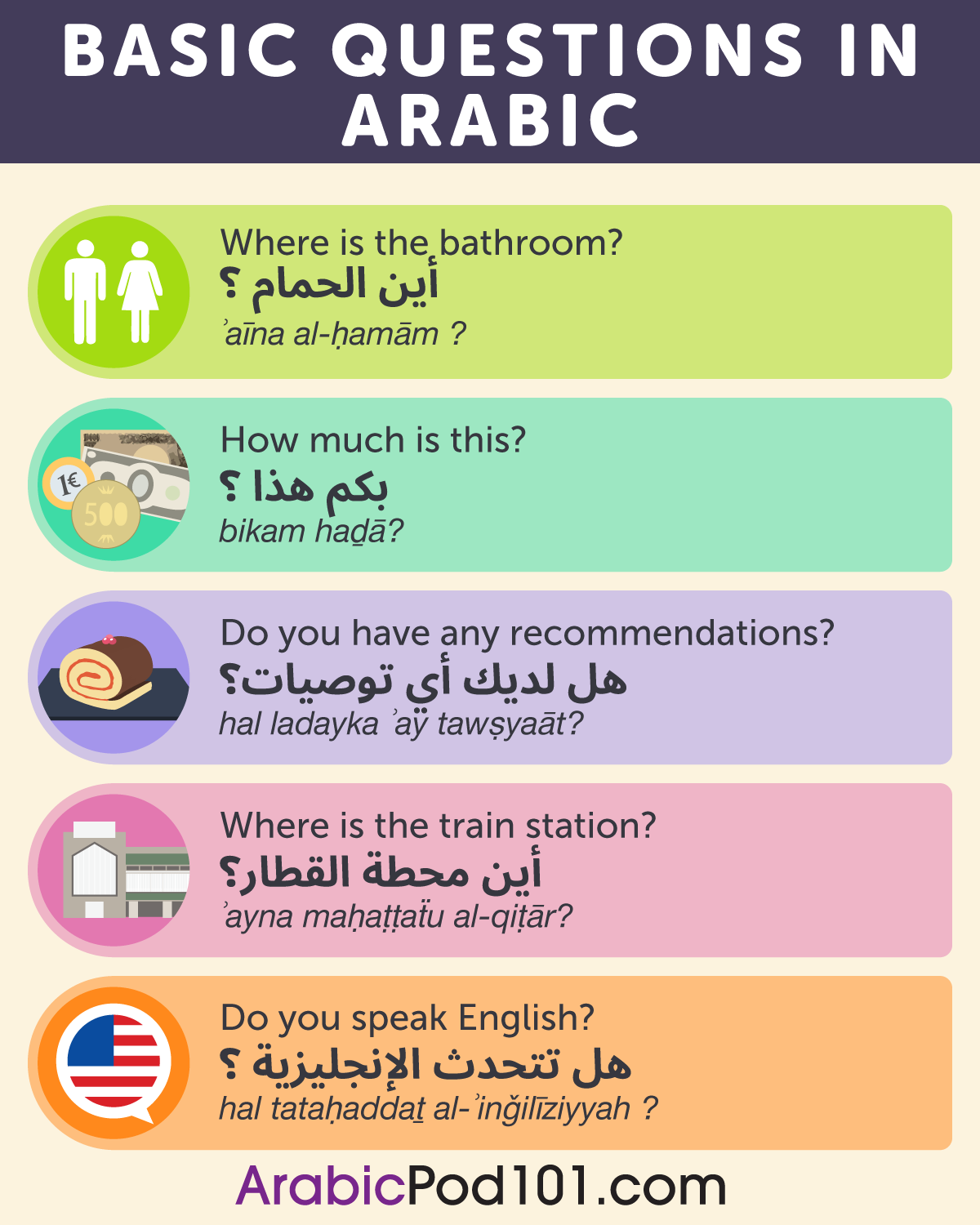Isn’t it exciting to imagine?
The crashing surf of a Moroccan beach or the tall and rugged mountains of Jordan. The streetside bazaars in Cairo or the resorts in Dubai.
And you’re there. Speaking in Arabic.
Or rather, that’s the plan, right?
You’re still working on it. And that’s okay. Arabic is a long, long journey for anybody.
Speaking of journeys, there are a couple of Arabic travel phrases that tourists need to learn in the local language, no matter where they go. In this article, I’ll outline some of the most useful travel phrases in Arabic for any traveler, tourist, or expat in an Arabic-speaking country. Let’s get started.
Table of Contents
- Using Modern Standard Arabic vs. Using Dialects
- The Most Essential Arabic Vocabulary and Phrases for Your Travel Needs
- Conclusion: ArabicPod101 is Your Guide to Arabic Mastery
1. Using Modern Standard Arabic vs. Using Dialects
Before you learn Arabic travel phrases, we need to go over the topic of MSA vs. dialects.
When it comes to Arabic words and phrases for travellers, this is a perpetual debate among Arabic learners.
Is it better to start with MSA or with a dialect? What if you’re planning to visit more than one country? What if you’re hanging out in a cafe in Egypt, and suddenly your friend from Iraq and his roommate from Morocco come in? What do you speak?
The position of this article is: Start with MSA. In terms of Arabic travel phrases for beginners, this is the best place to begin.
Most people in the Arab world won’t be able to speak MSA to you. They’ll do their best, but they may end up switching to another international language or just trying to make their local language sound as close to MSA as possible.
But you’ll be understood wherever you go, and when traveling, that’s what matters most. With a basic or intermediate ability in MSA, you can easily express your travel needs—not to mention read what’s written around you everywhere!
Once you’re able to express yourself in MSA, read up on the local language of wherever you’re planning to go, and listen to learning materials or native content as much as you can to get prepared for the answers you hear.
2. The Most Essential Arabic Vocabulary and Phrases for Your Travel Needs
Now, without further ado, here are Arabic travel phrases for your trip that you need to know!
1- Basic Expressions
What types of things do tourists usually say?
Pretty much the same things over and over, it turns out. Being able to speak a language “at a tourist level,” to me, means that you can handle the situations that are likely to come up, without necessarily being able to hold a real conversation.
That means, for instance, that you can order, pay for, and maybe even compliment a meal pretty smoothly in Arabic, but if the cook asks if you have that kind of food in your own country, you might find yourself grasping for words.
But hey, you’ve got to start somewhere, right?
If you only look at one guide to tourist Arabic, it should be the next three paragraphs. Here, I go over the most important Arabic travel phrases, the one you shouldn’t be traveling without.
2- Greetings and Goodbyes
We’ll start with the first words out of anybody’s mouth: Hello.
- “Hello!”
Ahlan!
أَهلاً
In Arabic, there are appropriate hellos for the morning, evening, and night.
- “Good morning!”
ṣabāḥu al-ḫayr
صَباحُ الخَيْر - “Good evening!”
masāʾu al-ḫayr
مَساءُ الخَيْر - “Good night!”
laylah saʿīdah
لَيْلَة سَعيدَة
Now let’s have a look at how to properly address people that you need to talk to. How should you get their attention?
- “Excuse me. Could you tell me…”
raǧāʾ, hal yumkinuka ʾiḫbārī…
رَجاء, هَل يُمكِنُكَ إخباري…
And when you’ve finished what you need to do, it’s time to take your leave.
- “Goodbye!”
ʾilā al-liqāʾ
إلى اللِقاء
3- Manners
Although you can point and grunt your way through a language barrier, it’s simply good manners to be able to use a couple of nice words when the time comes.
- “This one, please.”
haḏihi min faḍlik.
.هَذِهِ مِن فَضلِك
Suppose you’re on the bus and an elderly man gets on. The polite thing to do is offer your seat with the phrase:
- “Go ahead.”
tafaḍḍal.
.تَفَضَّل
I personally always like to learn “thank you” in as many languages as I can, just in case. If there’s one phrase you remember after reading this article, make it this one.
- “Thank you!”
šukran!
!شُكراً - “Thank you very much!”
šukran ǧazīlan!
!شُكراً جَزيلاً
Of course, guests aren’t the only ones doing the thanking. An exchange of “thank you” is likely to occur several times any time that money is exchanged for goods or services.
This means you’ll have to be ready with the “It’s nothing” and “Sure thing!” equivalent in Arabic.
- “No problem!”
lā muškilah
لا مُشكِلَة
4- Compliments
It’s amazing how far you can get in a foreign language by pointing, smiling, and saying “Good!” People simply love to hear that! And it’s one of the simplest Arabic-language travel phrases.
The word for “good” in Arabic is جَيِّد (ǧayyid). But you can do a little bit better.
- “I really like this!”
yuʿǧibunī haḏā kaṯīran!
يُعجِبُني هَذا كَثيراً!
For referring to food you just had:
- “It was excellent!”
kān rāʾiʿan!
!كان رائِعاً
For looking at a view from a room or complimenting something aesthetic:
- “This is so beautiful!”
haḏā ǧamīlun ǧiddan!
!هَذا جَميلٌ جِدّاً
5- Transportation
One pretty scary challenge in a foreign language is making a phone call. And if your language skills make the difference between arriving at the airport on time or arriving at the bus station two hours late, the pressure starts to get pretty high.
When you order a taxi in a foreign language, it’s a good idea to speak loudly and slowly, and probably repeat yourself a couple of times to make sure they understand.
The thing is, though, taxi companies are used to hearing the same sort of formula said over and over with a variety of different accents, so as long as you’ve got all the right words in there, you’re probably good to go.
- “I want to order a taxi to the airport for tomorrow morning.”
ʾurīdu sayyāraẗa ʾuǧrah ʾilā al-maṭār ġadan ṣabāḥan.
.أُريدُ سَيّارَةَ أُجرَة إلى المَطار غَداً صَباحاً
It never hurts to double-check:
- “Did you understand all that?”
hal fahimt?
هَل فَهِمت؟
Shuttle buses and minibuses are very popular in many Middle Eastern countries. Here are some vital phrases for dealing with those:
- “Does this bus go to…?”
hal taḏhabu haḏihi al-ḥāfilah ʾilā…?
هَل تَذهَبُ هَذِهِ الحافِلَة إلى…؟ - “Where can I buy a ticket?”
ʾayn yumkinunī širāʾ taḏkarah?
أَيْن يُمكِنُني شِراء تَذكَرَة؟ - “I want two tickets to … please.”
ʾurīdu taḏkarataīn ʾilā… min faḍlik.
أُريدُ تَذكَرَتَين إلى… مِن فَضلِك.
6- Shopping
When most people imagine shopping in Arabic, the first thing that comes to mind is that stereotypical image of a crowded street market.
You know the one: goats, toothless old men selling rugs, maybe a snake charmer in the corner. Something out of Indiana Jones.
Those definitely still exist (or at least street markets do), but don’t forget that big cities in the Arab world are pretty much like big cities anywhere else.
You’ll find just as many big air-conditioned malls with local and international brands. Need some Nikes or Levi’s? No problem.
And guess what? You’ll need Arabic there, too! Just because a brand is international doesn’t mean all the shop staff will be amazingly multilingual. That’s particularly the case if you go out of the touristed city centers and head to the other malls further out of the way.
- “Do you have a bigger size? / Do you have a smaller size?”
hal ladaykum ḥaǧmun ʾakbar? / hal ladaykum ḥaǧm ʾaṣġar?
هَل لَدَيْكُم حَجمٌ أَكبَر؟ / هَل لَدَيْكُم حَجم أَصغَر؟ - “I’m looking for jeans size 32/34.”
ʾabḥaṯ ʿan sarāūīl ǧīnz min maqās ʾiṯnān wa ṯalāṯūn ʿalā ʾarbaʿah wa ṯalāṯūn.
أَبحَث عَن سَراويل جينز مِن مَقاس إثنان و ثَلاثون عَلى أَربَعَة و ثَلاثون. - “Can you make it any cheaper?”
hal min taḫfīḍ?
هَل مِن تَخفيض؟ - “Okay, I’ll take it!”
ǧayyid, saʾāḫuḏuh
جَيِّد, سَآخُذُه
Part of bargaining effectively is knowing when to quit, or perhaps when to fake quitting so that you can get a better deal. Whether or not you’re serious about walking away, it’s polite to say something like this as you go:
- “Maybe next time.”
rubbamā fī al-marrah al-qādimah.
رُبَّما في المَرَّة القادِمَة.
7- Restaurants
- “How do you say this?”
kayfa yunṭaqu haḏā?
كَيْفَ يُنطَقُ هَذا؟
It’s very likely that you’ll find things on the menu that you’re not able to pronounce. Depending on your study motivation, you might still have trouble with the Arabic alphabet when you arrive.
So you can ask somebody nearby to read out the name of the food. Maybe you’ve heard of something similar at another restaurant, or maybe it even has a loanword in its name that you’re familiar with.
- “What exactly is…?”
mā … bilḍabṭ?
ما … بِالضَبط؟
You may not understand the answer in its entirety—food words are notoriously specific and vary based on location. But the important thing is to keep your ears tuned for loanwords you may recognize, as well as the body language of the person you’re talking to. If they look like they’re holding back a smile or silently guessing that you won’t like it, better order something else.
Travelers with allergies can have a rough time of it in foreign countries. Many expats don’t speak the language of the country of residency except the words for things they can’t eat. It’s imperative to know those words well.
- “I’m allergic to …”
laday ḥasāsiyyah min…
لَدَيْ حَساسِيَّة مِن…
Here, you simply say the phrase, tacking on the name of the food you can’t eat. For a list of common food names, check out this vocabulary list on ArabicPod101.com. (It includes common allergens like peanuts and soybeans!)
Once you’ve enjoyed your meal and are ready to leave, you’d best know this phrase:
- “Can I have the bill, please?”
hal yumkinunī ʾaḫḏ al-fātūrah laū samaḥt?
هَل يُمكِنُني أَخذ الفاتورَة لَو سَمَحت؟
8- Directions
Directions are relatively complicated, and they’re not made any easier the way they get taught in a lot of coursebooks.
Have you ever noticed how in textbooks, people are always giving each other complicated directions in order to fit in as many vocabulary words as possible?
- “Where is …?”
ʾayna…?
أَيْنَ…؟ - “I’m looking for the…”
ʾabḥaṯu ʿan…
أَبحَث عَن… - “It’s over there.”
ʾinnahā hunāk.
إنَّها هُناك. - “Go straight down this road.”
iāḏahab mubāšaraẗan ʿalā haḏā al-ṭarīq.
.ِاذَهَب مُباشَرَةً عَلى هَذا الطَريق - “You need to take the number 10 bus.”
ʿalayka ʾan taʾḫuḏ al-ḥāfilah raqm 10.
عَلَيْكَ أَن تَأخُذ الحافِلَة رَقم 10. - “Is it far?”
hal hiya baʿīdah?
هَل هِيَ بَعيدَة؟ - “Can I walk there?”
hal yumkinunī al-mašī hunāk?
هَل يُمكِنُني المَشي هُناك؟
Really, these basic Arabic travel phrases are enough to get you from A to B in most cases. But it’s always good to have more complex direction phrases in your Arabic arsenal, just in case.
9- Emergencies
- “Do you have a bathroom?”
hal ladaykum ḥammām?
هَل لَدَيْكُم حَمّام؟ - “I lost my passport.”
faqadtu ǧawaza safarī.
فَقَدتُ جَوَازَ سَفَري. - “I need to go to a hospital.”
ʾanā biḥāǧah lilḏahāb ʾilā mustašfā.
أَنا بِحاجَة لِلذَهاب إلى مُستَشفى. - “May I please borrow your phone? It’s an emergency.”
hal yumkinunī istiʿāraẗu hātifik? ladayya ḥal-ah ṭāriʾah
هَل يُمكِنُني اِستِعارَةُ هاتِفِك؟ لَدَيَّ حالَة طارِئَة - “My phone was stolen.”
laqad tammat sariqaẗu hātifī.
لَقَد تَمَّت سَرِقَةُ هاتِفي.
If you’ve lost something in a public space, you may be in luck if an honest stranger turned it in to the information desk. In that case, you can ask:
- “Did anyone find a laptop here?”
hal waǧad ʾaḥaduhum ḥāsūban hunā?
هَل وَجَد أَحَدُهُم حاسوباً هُنا؟
10- Language Troubles and Triumphs
Speaking Arabic when you’re out and about isn’t going to be all smooth sailing, no matter how easy it may seem when you’re flipping through a phrasebook.
There’s a helpful set of phrases that can really go a long way toward smoothing things over when your vocabulary or grammar fails you.
- “How do you say…?”
kayfa taqūl…?
كَيْفَ تَقول…؟ - “Does anyone here speak English? French?”
hal yatakallamu ʾaḥaduhum al-ʾinǧlīziyyah ʾaw al-firinsiyyah hunā?
هَل يَتَكَلَّمُ أَحَدُهُم الإنجليزِيَّة أَوْ الفِرِنسِيَّة هُنا؟ - “I don’t know that word.”
lā ʾaʿrifu haḏihi al-kalimah.
لا أَعرِفُ هَذِهِ الكَلِمَة. - “Thank you! I’ve been learning for one year.”
šukran. ʾanā ʾataʿallam min sanah.
شُكراً. أَنا أَتَعَلَّم مِن سَنَة. - “Sorry, my Arabic isn’t very good.”
ʾāsif, luġatī al-ʿarabiyyah laysat ǧayyidah
آسِف، لُغَتي العَرَبِيَّة لَيْسَت جَيِّدَة - “Sorry, I can’t read Arabic very well.”
ʾāsif , lā ʾastaṭīʿ qirāʾaẗa al-ʿarabiyyaẗa ǧayyidan
آسِف ، لا أَستَطيع قِراءَةَ العَرَبِيَّةَ جَيِّداً - “You just said ___. What does that mean?”
laqad qult al-ʾān… māḏā yaʿnī ḏalik?
لَقَد قُلت الآن… ماذا يَعني ذَلِك؟
3. Conclusion: ArabicPod101 is Your Guide to Arabic Mastery
Now that you’re packed with the most useful Arabic travel phrases, you’re all set for your next adventure. Want to learn even more Arabic? Check out ArabicPod101.com and get access to more than a thousand Arabic learning audio and video lessons that will take your Arabic to the next level.
Until next time, let us know how comfortable you feel with Arabic travel phrases. Is there anything you’re still struggling with? Drop us a comment and tell us about it!
Author: Yassir Sahnoun is a HubSpot certified content strategist, copywriter and polyglot who works with language learning companies. He helps companies attract sales using content strategy, copywriting, blogging, email marketing & more.



















